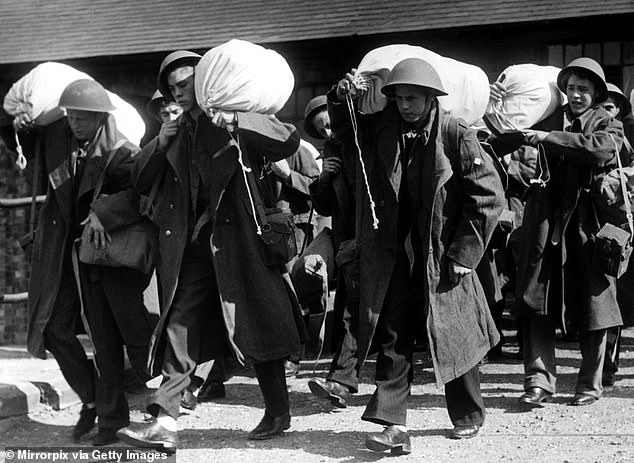Would you join the British army to fight for King and country? How would you feel if your children were conscripted?
With America now reluctant to guarantee the defence of Europe, such questions have returned with a vengeance.
And, not so long ago, I would have been among the willing volunteers. I’m 23, count myself a patriot and once thought I would have fought and died for this country. Yet I would rather be a conscientious objector than take up arms for Keir Starmer’s Britain.
I know I’m not alone in this and that my concerns – revulsion, even – are widely shared by other young Brits in their 20s.
A recent survey of Generation Z (born between 1997 and 2012) suggested that only 11 per cent of them would fight for Britain, while an alarming 41 per cent said there were no circumstances at all in which they would take up arms for their country.
I can’t say I am surprised. What precisely are we supposed to be defending?
The Britain that inspired the generations that made such sacrifices during two world wars has been swept away in a tide of mass migration, self-hatred and woke ‘progressive’ propaganda.
Our political class, university leaders, quangocrats, broadcasters and others – in a word, the elite – have spent decades attacking our collective identity: the very sense of solidarity vital for our own defence.
Now we see the results.

Political strategist and broadcaster Charlie Downes was turned down by the army at a time when Britain’s armed forces are in the grip of a recruitment emergency
Too many of my friends have been persuaded there is something almost shameful about being British. Indeed, that same recent survey, carried out by YouGov and Public First, revealed that 48 per cent of 18 to 27-year-olds believed Britain is a ‘racist country’ – far higher than the proportion that said they didn’t.
And when it comes to their financial prospects, they have few reasons for optimism. The economy has little to offer millions of young working-age Britons, who look around and see a nation of graffiti-fouled high streets and boarded-up shops.
For my generation, bettering themselves through hard work is little more than a pipe-dream – or would be, if the local tobacconist had not been turned into a tattoo parlour or a ‘Turkish’ barbershop, which are often fronts for money-laundering.
Living standards have actually declined since 2008, the year of the Great Financial Crash. Then, the average annual wage in Britain was around £25,000, equivalent to £40,000 today. Yet today, we earn an average of only £37,000 – meaning that earnings haven’t even kept pace with inflation.
In the US, by contrast, wages have grown healthily since 2008, bringing the average US pay packet to around $66,000 a year (more than £51,000).
Most twentysomethings stand little chance of getting on the housing ladder, all too often condemned to a life of bedsits and flat-shares at ruinous expense – if they leave home at all.
The proportion of 25 to 34-year-olds still living with their parents has risen by more than a third in less than two decades.
Then there is the question of not just what we are defending, but who.

Young British Army National Service recruits, still partly dressed in civilian clothes, pick up military clothing and equipment at a barracks in 1947
Thanks to unchecked mass migration – appallingly accelerated under the last Tory government – Britain has undergone a bewildering and probably permanent change.
It is hard to overstate the scale. The population of England, for example, is expected to rise to 73 million by mid-2032, up from 68 million in mid-2022.
This ballooning population is entirely driven by new arrivals and their families. New census data last week revealed that 10 per cent of the people living in this country were born overseas and that close to a million are unable to speak English competently or – in many cases – at all.
It’s no wonder that a pervasive sense of dislocation and disruption is sweeping the country.
Yet the most destructive force of all has been inflicted from within: by which I mean the self-hating ideology that justifies – even celebrates – these changes.
Whether at school, in theatres or through the propaganda pumped out by leading museums, our cultural leaders invariably denigrate our shared past, preferring to promote ‘inclusion’ and other abstract banalities.
What sort of a country, for example, portrays itself as a historic enslaver, ignoring the fact that Britain led the way in abolishing that evil trade around the world?
Starmer’s Labour is making matters worse still. We have an attorney general who has made a career out of appeasing Britain’s enemies and a prime minister who believes that ‘Human Rights’ and international law trump any domestic priorities.

A recent survey of Generation Z suggested that only 11 per cent of them would fight for Britain
Any dissent is ruthlessly suppressed. The Mail on Sunday recently exposed how two police officers were dispatched to a grandmother in Stockport for doing no more than expressing mild criticism of Labour politicians on Facebook.
A dog owner in Herefordshire was questioned by the police just a few days later, grilled by uniformed officers for more than an hour after merely rowing with a neighbour.
Britain seems to have abandoned the shared understandings, traditions and ways of life that served us well for centuries.
Instead, we are told that our multicultural identity lies in a set of ‘British values’ – airy principles that are, in reality, little more than platitudes.
They may be fine ideals, but which of us would honestly lay down their life, for example, for ‘diversity’ or ‘tolerance’?
No one fought in the horrors of Passchendaele or the Somme for that.
I feel all this disappointment personally. It had been my long-held ambition to become an infantry officer in the British Army, and in 2023 I applied to join.
A soldier’s way of life appeals to me: I like the physical demands, the strategising and the discipline.
Yet after disclosing that I occasionally experience mild migraines (information that doesn’t even appear on my medical record and which would not have affected my duties), I was denied the opportunity to serve. Britain’s armed forces are in the grip, remember, of a recruitment emergency.
This petty episode tells you something about the red tape plaguing our military, which also stands accused of prioritising diversity over talent.
Last year, the head of the RAF was forced to admit that attempts to attract women and people from ethnic minority backgrounds had discriminated against white men.
Let me be clear: I would fight if Britain were invaded. I would not hesitate to pick up a rifle and head to the frontline.
Yet fighting in, say, Ukraine, would be a very different matter. If there is a ceasefire between Moscow and Kyiv, this country might well be called on to station peacekeepers on the long frontline – an ‘Army of the Dnieper’ as it has been called after the river that represents an informal border between the two sides along much of its length.
Describing Russian aggression as an ‘existential threat’ to Europe, Keir Starmer has insisted the UK must be ‘ready and willing’ to put troops on the frontline.
Perhaps. But I won’t be among them.
Britain – and Europe more widely – once claimed to stand for values such as liberal democracy, liberty, tolerance, the rule of law and equal rights. How hollow those claims sound today.
For young people, Britain has become a place where taxes are astronomical, industry lies in crisis, the culture is subverted and our people are demoralised and lost.
This is a catastrophic betrayal of the country that I love. And if young men and women like me are no longer prepared to fight for it, who will?
- Charlie Downes is a political strategist and broadcaster







